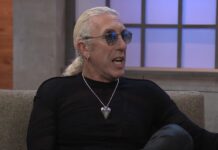Autopsy: The Last Hours of Chris Cornell is set to premiere on the Reelz Channel on Sunday at 9PM EST. Alternative Nation had a chance to view an advance copy of the episode.
Medical examiner Dr. Michael Hunter, who has performed 5,000 autopsies, discusses Cornell’s childhood and teen experimentation with PCP and LSD, and how it could have hurt him long term.
“LSD or acid is a psychedelic drug known for its psychological affects. Psychedelic drugs work by interfering with the brain’s serotonin and dopamine receptors, resulting in altered moods, and hallucinations. Effects can last as long as 12 hours. I can see that Chris also used PCP, also known as Angel Dust.
PCP and LSD do similar things to the brain, but LSD is a psychedelic drug causing the user to see shapes, patterns, and colors that aren’t there, while PCP is a dissociative anesthetic drug, which disconnects individuals from reality. In both cases, users can experience what is known as a bad trip. When feelings of euphoria change to feelings of extreme anxiety and terrifying thoughts. This can be very traumatizing, especially for a 12-year old.”
He later says, “Reports state that Chris suffered from agoraphobia, and this could well have been a result of his early experimentation with drugs. The use of PCP and LSD can cause a chemical imbalance in the brain, leading to a heightened stress response in certain situations, triggering a feeling of panic.”
Dr. Linda Papadopoulos, a psychologist, says, “Agoraphobia is a fear of being out in open spaces, out in public. It comes from the Greek word agora, which means market place. It’s this worry that if I’m out of this small place I feel safe in, which is usually one’s home, then I’ll die, I’ll have a panic attack, I won’t be able to breathe, I’ll lose control. What happens is people tend to deal with this by avoiding.”
It is then mentioned that Chris said he gave up hallucinogenic drugs when he was 14. Dr. Hunter said despite quitting the drugs young, they could have had long term effects.
“I cannot underestimate the negative long term effects these drugs have on a young and developing brain.”
Cornell was taking the anti-anxiety medication Ativan at the time of his death, and told a friend in a March 22, 2017 email that he had relapsed. Vicky Cornell has said that the drug played a role in his death.














